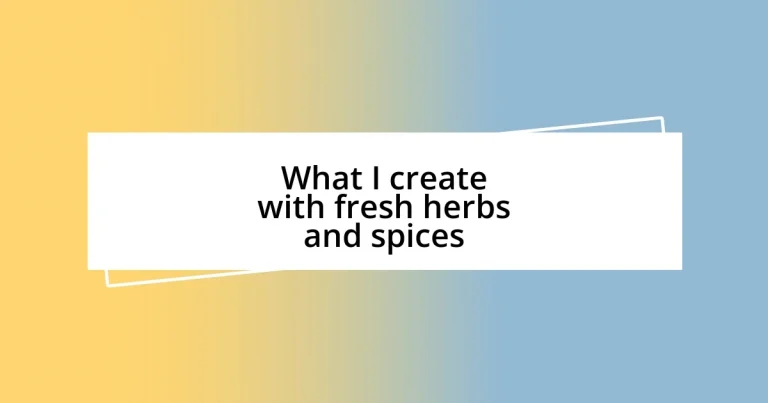Key takeaways:
- Fresh herbs and spices significantly enhance the flavor and overall experience of dishes, transforming simple meals into memorable ones.
- Pairing herbs with specific dishes can create delightful flavor harmonies, elevating the overall dining experience.
- Preserving herbs through drying, freezing, or making infused oils not only maintains their flavor but also creates lasting culinary memories.
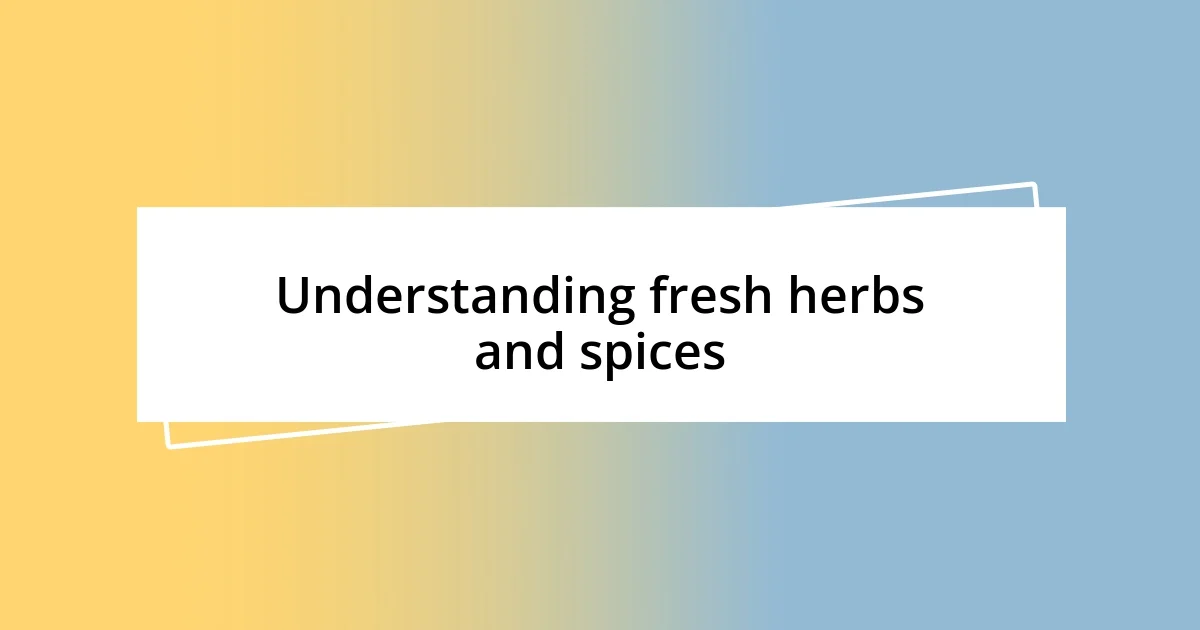
Understanding fresh herbs and spices
Fresh herbs and spices are not just added flavors; they’re the essence of culinary creativity. I remember the first time I snipped fresh basil right from my garden and added it to a simple tomato salad. The difference was extraordinary, and it made me realize how much depth these ingredients bring to a dish. Have you ever tasted the vibrant brightness of fresh cilantro compared to its dried counterpart? It’s like the difference between black and white and the full spectrum of color.
Understanding the distinction between herbs and spices can be a revelation in your cooking journey. Herbs, the leafy parts of plants like parsley or thyme, often lend freshness to a dish, while spices, derived from seeds, bark, or roots like cinnamon or cumin, contribute warmth and aromatic complexity. This differentiation isn’t just about classification; it influences the way you blend flavors. Have you thought about how using a fresh herb can elevate a simple meal into something sensational?
When I started experimenting with spices, I dove into the world of complex flavor profiles. I vividly recall crafting a Moroccan tagine, where the spices transported me to far-off lands with every bite. Did you know that spices can carry historical and cultural significance, giving you a taste of tradition? With each sprinkle, I not only enhance my dishes but also add a touch of storytelling and connection to different cuisines.
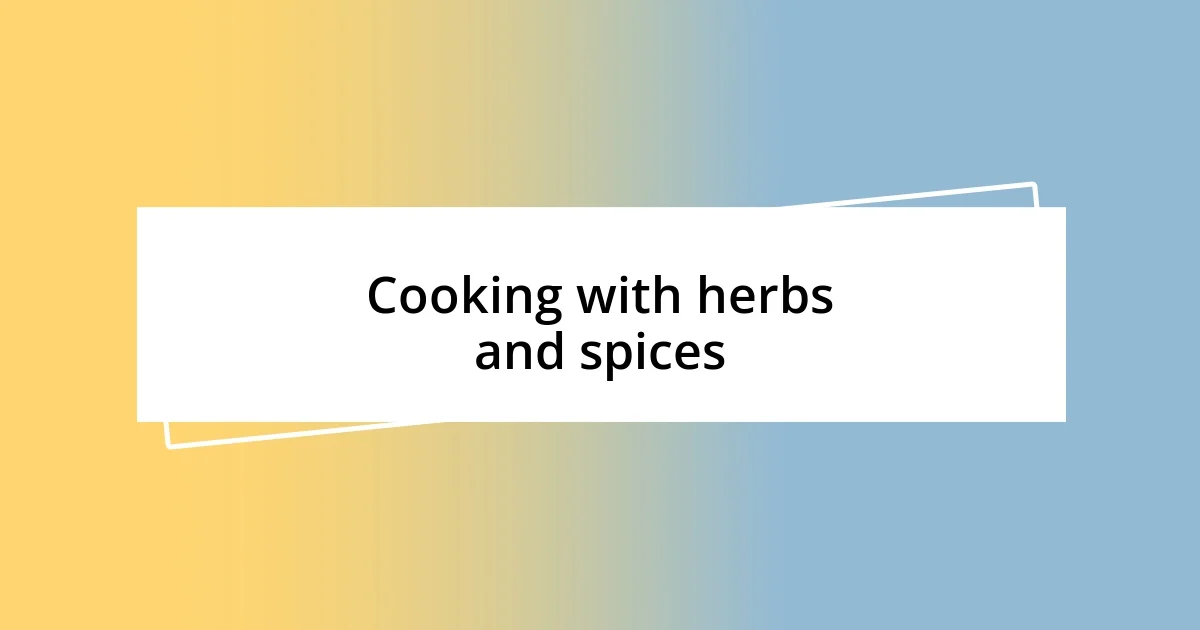
Cooking with herbs and spices
Cooking with herbs and spices transforms our culinary experience, elevating even the simplest of dishes. When I toss a pinch of oregano into a rich marinara, I vividly remember that delightful dinner gathering with friends, where the aroma wafted through my kitchen, making everyone eager for what was to come. It was a small addition, yet the herb wrapped the pasta in a comforting embrace of flavor, reminding me how such subtle changes can transform a meal into a memorable occasion.
I find that fresh herbs can also serve as beautiful garnishes, adding not just flavor but visual appeal. For instance, a handful of microgreens sprinkled over a creamy soup can add a burst of color and freshness that tantalizes the taste buds. Plus, it’s a great conversation starter—nothing like sharing a little story about how I grew those herbs myself to break the ice at dinner!
Exploring spices often opens up new avenues in my cooking, sometimes introducing me to flavors I never knew I was missing. I once held a dinner party featuring an array of dishes seasoned with sumac, and I was surprised by how much my guests loved the tangy, lemony notes it added. Their reactions reminded me that trying something new, whether it’s a spice or an herb, can create culinary adventures that make our gatherings special and memorable.
| Herb/Spice | Main Flavor Profile |
|---|---|
| Basil | Sweet and slightly peppery |
| Cilantro | Bright and citrusy |
| Oregano | Earthy and warm |
| Cumin | Nutty and spicy |
| Sumac | Tangy and lemony |
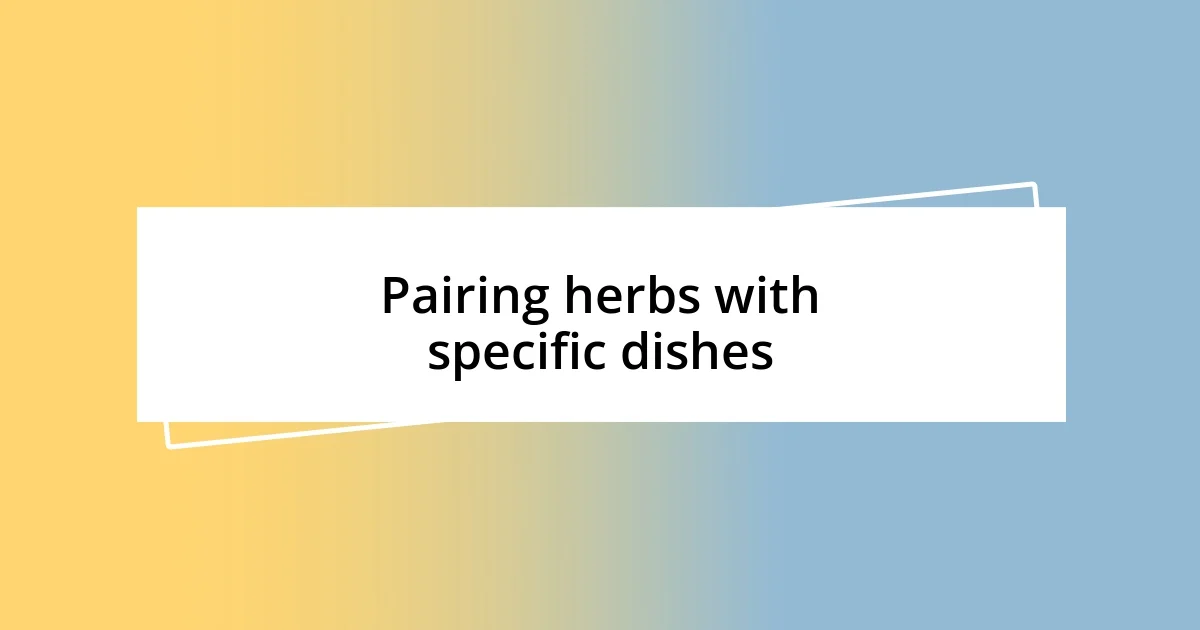
Pairing herbs with specific dishes
When it comes to pairing herbs with specific dishes, I’ve learned that the right combination can create a delightful harmony. I remember hosting a summer barbecue, where I brushed fresh rosemary on grilled lamb chops. The way the herb’s earthy flavor elevated the meat was nothing short of magical, weaving together a fragrant experience that took our gathering to another level.
Here are some more herb and dish pairings I’ve found particularly effective:
- Thyme with roasted chicken enhances the savoriness.
- Dill complementsz salmon perfectly, offering a refreshing balance.
- Parsley brightens up tabbouleh, adding a vibrant note to the whole dish.
- Mint works wonders with fruit salads, bringing a cool sweetness.
- Sage pairs beautifully with butternut squash, deepening the rich flavors.
I often think about how cumin has a way of awakening dishes. I once made a spiced chickpea stew, simmering with cumin, garlic, and tomatoes. The aroma wafted through my kitchen, wrapping me in its warmth, as I realized how such a simple spice could create an inviting atmosphere that drew my family to the table, eager for that first bite.
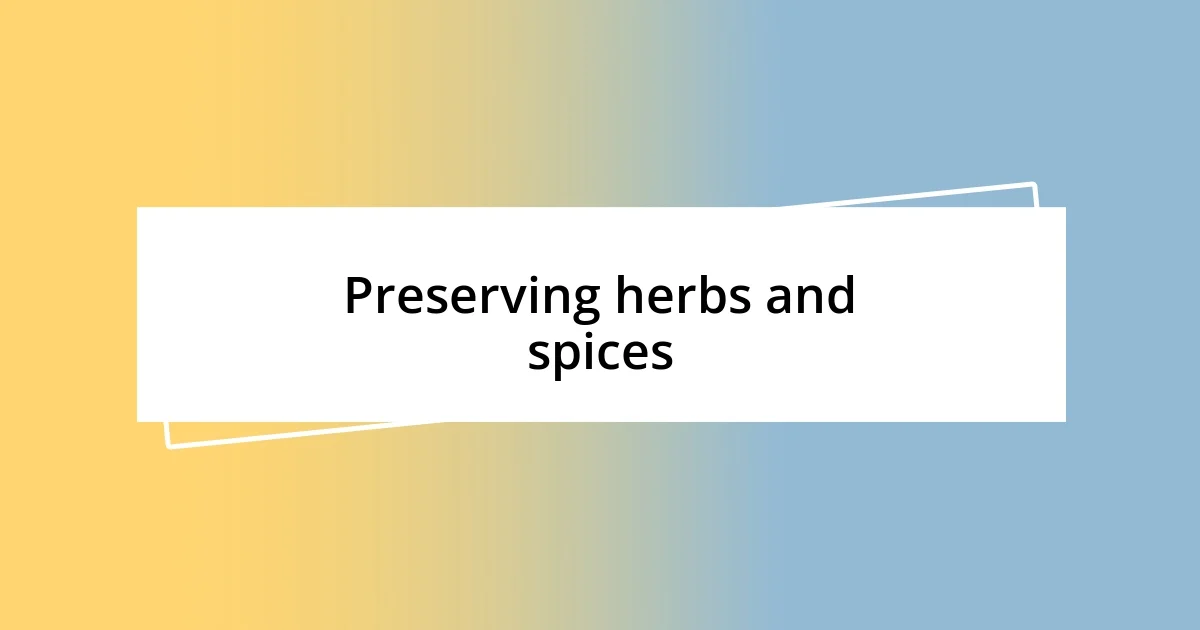
Preserving herbs and spices
Preserving fresh herbs and spices is an art that I’ve come to appreciate over the years. One of my favorite methods is drying them. I vividly recall the first time I hung a bundle of lavender in my kitchen. The warm, calming scent enveloped the room, reminding me of sun-soaked afternoons spent in my garden. It not only preserved the herb for later use but also filled my space with a tranquil aroma.
Another technique I cherish is freezing. When I chop fresh basil and tuck it into an ice cube tray filled with olive oil, I feel a sense of accomplishment. It’s such a simple act, yet I know that during winter, I’ll have a taste of summer to brighten my dishes. I love the anticipation of pulling out those cubes, knowing they’ll infuse my meals with vibrant flavors while I reminisce about those sunny days in my garden.
Additionally, I often make herb-infused oils. I remember hosting a dinner party where I used rosemary-infused oil for bread dipping. As my friends savored the rich flavor, I thought about the beauty of preserving herbs—not just for flavor but to create memories. Isn’t it wonderful to think that a simple oil can transport you back to a moment spent among friends, sharing laughter and stories?












